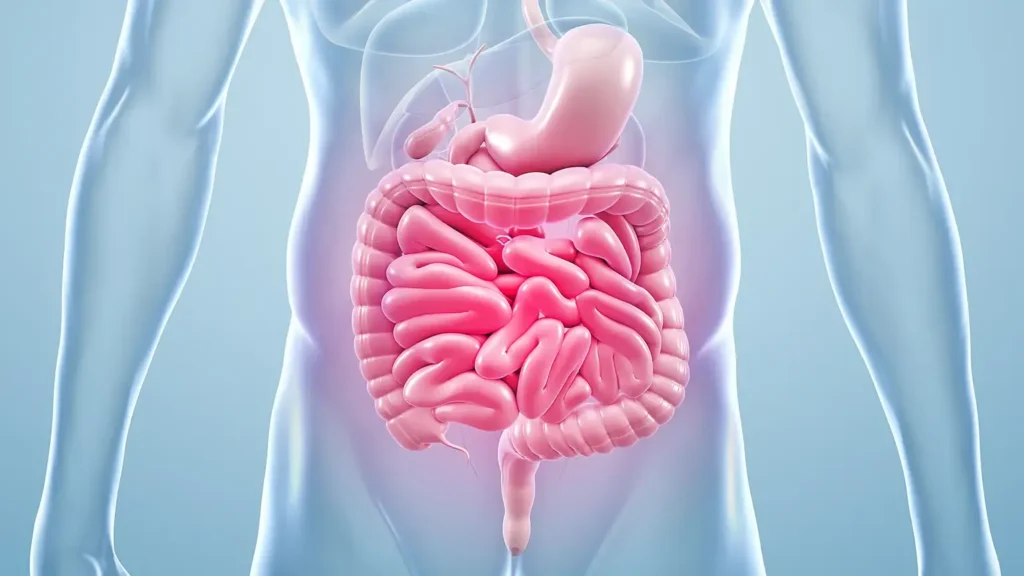Read time : 5.5 minutes

Bananas are one of the most accessible and nutrient-rich fruits nature has to offer. Beyond their sweet taste and portability, bananas offer an impressive array of nutrients that do far more than satisfy a midday craving—they support your body in meaningful ways, particularly your digestive system.
Which Important Nutrients Do Bananas Contain?
A medium banana (about 7 inches long) contains:
- Calories: 112
- Magnesium: 8% of the DV
- Carbohydrates: 29g
- Fiber: 3g
- Protein: 1g
- Fat: 0.4g
- Vitamin C: 12% of the Daily Value (DV)
- Copper: 11% of the DV
- Potassium: 10% of the DV
This nutrient profile makes bananas a go-to fruit for digestive wellness. They contain a unique trio that benefits [gut health]
- Fiber: A blend of soluble and insoluble types
- Resistant starch: Especially present in unripe bananas
- Electrolytes (potassium and magnesium): Which support gut muscle function and fluid balance
How Bananas Fix Your Gut

1. Fiber Regulates Bowel Movements
The fiber in bananas isn’t just filler—it plays a vital role:
- Soluble fiber(like pectin) absorbs water and softens stools, easing constipation.
- Insoluble fiber adds bulk and speeds up intestinal transit, preventing sluggish digestion.
This fiber combo helps avoid digestive extremes. In fact, studies have shown regular banana intake can reduce irregularity in people with sensitive digestion by up to 50%.
2. Prebiotics Fuel the Gut Microbiome
Unripe bananas are rich in resistant starch, a prebiotic that resists digestion in the small intestine. When it reaches the colon, it feeds beneficial gut bacteria. A thriving microbiome isn’t just good for digestion—it also supports immunity, mental clarity, and even skin health.
3. Gut-Soothing Nutrients
Bananas’ potassium and magnesium act as natural electrolytes, helping relax intestinal muscles. This eases spasms, reduces bloating, and supports smooth digestive flow. It’s why athletes often eat bananas to avoid stomach distress during activity.
Who Benefits Most From Bananas?
- Irritable Bowel Syndrome (IBS) Sufferers. A common chronic gastrointestinal disorder that affects the large intestine (colon) : Ripe bananas are low-FODMAP (Fermentable Oligosaccharides, Disaccharides, Monosaccharides, and Polyols), making them gut-friendly for those with irritable bowel syndrome.
- Post-Diarrhea Recovery: Bananas help restore electrolyte balance and support healthy stool formation.
- Individuals With Chronic Constipation: Their fiber content offers natural relief without the need for harsh laxatives.
Tips for Maximizing Digestive Benefits Of Bananas
1. Choose Ripeness Wisely
- Unripe (green): Higher in resistant starch—better for feeding probiotics.
- Ripe (yellow): Rich in soluble fiber—ideal for relieving constipation.
2. Pair for Synergy
- Add banana slices to yogurt for a prebiotic + probiotic combo.
- Blend or slice into oatmeal to double up on fiber and boost fullness
3. Avoid Overdoing It
- Stick to 1–2 bananas a day. Too much fiber, even from a good source, can cause bloating or discomfort in sensitive individuals.
Final Takeaway
Bananas aren’t just a tasty snack—they’re a strategic digestive aid wrapped in yellow. Their fiber, prebiotics, and gut-calming minerals work together to promote regularity, balance your microbiome, and soothe your gut. So next time you peel a banana, remember: you’re not just eating a fruit—you’re nourishing your entire digestive system.
RD, LD Julius Sammah
MyHealthCop Certified Dietician
Ready to Take the First Step?
👉 Book a 1-on-1 Session with any of our Certified Dietitian professionals to start your health journey today. [DOWNLOAD THE APP]